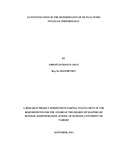| dc.description.abstract | Mutual funds provide an opportunity for investing to the many individuals who lack
financial knowledge. This eliminates the amount of time and resources required to
identify a ‘best buy’ share or security. To invest in a Mutual fund, investors buy units
through the fund manager at the prevailing selling price which is calculated daily. These
units can be bought any time as long as the fund has not reached its maximum approved
size. Mutual funds face competition from various alternatives, when fund performance is
generally not impressive. Studies done on mutual fund performance have reported that
most funds did not match performance of comparable market indexes. This study sought
to find out how Mutual Fund performance is affected by various determinants. This
helped investors to make informed decisions on their investment on Mutual Funds. The
descriptive research assets to enhance a systematic description that is as reliable, valid
and accurate as possible regarding the responses on the investment options available to
unit trust schemes and the aspects that are considered in selecting portfolio combination.
The study was also cover banking institutions with mutual funds. The study covered the
period 1st January 2008 to 30th December 2012 this study sought to evaluate annual
report data. The study solely used secondary data sources available at the companies’
books of account and the NSE or Capital Market Authority offices. The study used
multiple linear regression equation and the method of estimation will be Ordinary Least
Squares (OLS) so as to establish the relationship between determinants and performance.
The study revealed that the determinats of the performance of mutual funds financial
performance in Kenya were risk , transaction cost , size and country characteristic. The
study found that risk in the management of mutual funds cannot be ignored in any
investment venture. The risk of a security is the variability in its expected future returns.
High risk securities have high dispersion around the mean while low risk securities will
have a low dispersion around the mean. Risk as measured as the variability of returns has
received widespread acknowledgement in decision theory. Thus, risk viewed as the
variability of returns is quantified in terms of variability measures which include range,
mean absolute deviation, variance, standard deviation, and coefficients of variation. | en |

